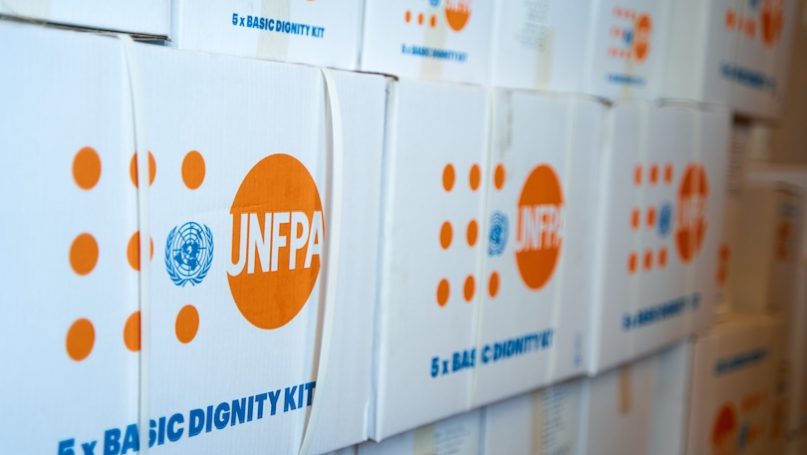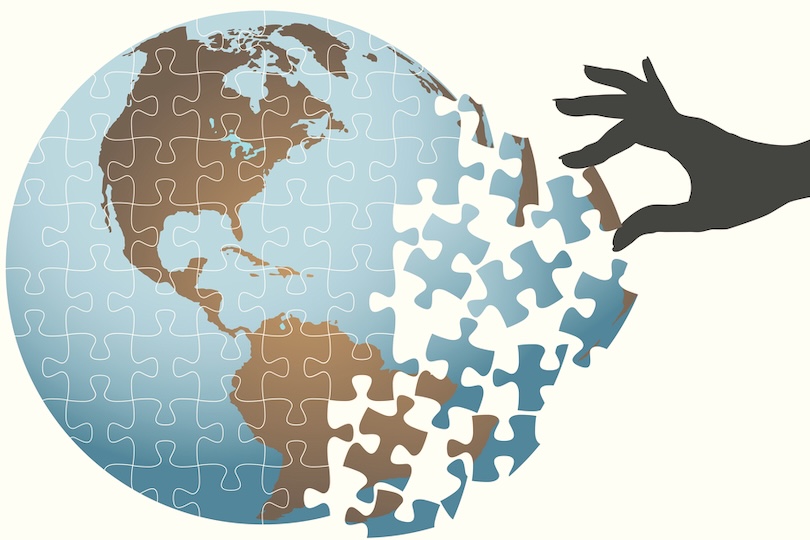
Try_my_best/Shutterstock
The U.S. government under President Donald Trump sent a stark signal to the world when it announced plans to freeze a wide range of foreign aid programmes, including contributions to the United Nations Population Fund (UNFPA). This marked not just a financial turning point, but an ideological one too. The policies implemented by the Trump administration are a clear example of an ideological regression in terms of reproductive health and women’s rights. As early as 2017, the administration reactivated the so-called ‘Global Gag Rule’. This regulation prohibits foreign non-governmental organisations from using US funds to provide any information about abortion, even indirectly. Studies show that this expansion had a significant impact on access to essential health services. Cuts resulted in a drastic reduction in access to modern contraceptives, an increase in unsafe abortions and further destabilisation of fragile health systems, particularly in conflict and crisis zones. These consequences worsened following Trump’s return to office in January 2025.
The current version of the Global Gag Rule goes even further than earlier versions. It applies not only to directly funded organisations, but also to their partner organisations, forcing them to forgo all reproductive health services regardless of funding source. The rule now cascades down, affecting even local civil society actors who are in any way connected to U.S. funding. Furthermore, the scope of affected health programmes has been expanded again to include initiatives on gender-based violence prevention, STI education and maternal and child health. Consequently, numerous projects and humanitarian organisations in vulnerable regions have been forced to suspend their work.
The UNFPA is the central UN agency responsible for promoting sexual and reproductive health and gender equality. It operates in over 150 countries, supporting access to family planning, safe childbirth and protection against gender-based violence, particularly in crisis settings. In 2024, the US provided approximately $32.5 million in funding. However, the U.S. government’s decision to terminate all funding for UNFPA in May 2025 has abruptly halted over 40 projects. This decision follows cancellations that the UNFPA has faced since Trump first took office, affecting more than 40 ongoing humanitarian projects worth around $335 million. The US had been one of UNFPA’s largest donors.
The termination of funding will particularly affect fragile settings, where millions of internally displaced persons, refugees, and vulnerable groups rely on UNFPA’s services. In Afghanistan, for instance, 9 million women will lose access to healthcare. Between 2025 and 2028, an estimated 1,200 additional maternal deaths and 109,000 unintended pregnancies could occur. UNFPA has had to reduce its support for women and girls in Turkey by almost 60 per cent, which will affect around 60,000 earthquake survivors and Syrian refugees.
Humanitarian aid encompasses much more than emergency medical care. It symbolises international solidarity and helps to restore autonomy and safety during extreme crises. Access to sexual and reproductive health (SRH) is a core component, especially for women and girls who often experience dual vulnerabilities in times of crisis, such as structural inequality and an increased risk of targeted gender-based violence. UNFPA promotes an inclusive model of humanitarian aid that incorporates childbirth services, contraception, STI prevention, psychosocial care, educational initiatives, and protection measures against gender-based violence. In acute emergencies, such as natural disasters, armed conflicts or refugee camps, safe spaces are crucial. These centres offer survivors of violence medical care as well as psychological, social and legal support.
Ensuring reproductive health is vital, not secondary. Data shows that around 500 women and girls die every day from pregnancy- and birth-related complications in humanitarian crises—many of which could be prevented with basic health services. Furthermore, studies show that a lack of sexual and reproductive health (SRH) services in crisis situations often leads to an increase in unsafe abortions, unintended pregnancies, and gender-based violence. Investing in reproductive health therefore has immediate benefits for physical well-being, promoting long-term resilience, social participation and gender equality. SRH services are an integral part of an effective emergency response system, not a “nice-to-have” extra in humanitarian aid.
The U.S. government’s decision to halt funding to the UNFPA highlights a structural weakness in the global aid system: its heavy reliance on a few major donor countries, particularly the U.S. This dependence leaves humanitarian organisations vulnerable, as their programmes are subject to political fluctuations and the strategic interests of individual states. Such political hostage-taking undermines the stability and sustainability of humanitarian aid, particularly during times of crisis. Despite the growing importance of private and philanthropic actors in development cooperation, their role remains limited. Their contributions are often uncoordinated, inconsistent and volatile by nature. While such initiatives can temporarily fill gaps, they rarely offer the continuity and reliability required for long-term humanitarian work.
Therefore, a more resilient and sustainable system should emphasise the diversification of funding sources. Humanitarian aid should not depend solely on a few large donors, but rather be supported by reliable multilateral partnerships. A balanced funding model combining contributions from the public and private sectors could help ensure the long-term effectiveness and independence of humanitarian assistance.
The targeted restriction of reproductive rights in humanitarian contexts is not an isolated setback; it is a clear warning signal of broader political shifts. As Jacqui True demonstrates, attacks on reproductive autonomy are structurally embedded in economic inequality, ideological power struggles and authoritarian rollbacks. Reproductive rights represent particularly vulnerable intersections, touching on both individual self-determination and state control over bodies, gender and power dynamics. In times of crisis, they are often the first to be challenged, being used as political symbols and strategic levers.
Humanitarian contexts are particularly affected: shelters for refugees, crisis regions and fragile states, where reproductive healthcare is already precarious, are losing essential service infrastructures. This retreat signals a fundamental political shift: reproductive rights are no longer considered protected by international law, but rather as negotiable values subject to the ideological orientation of individual governments. True argues that this reflects a deeper form of political violence; when states restrict reproductive justice, they intentionally undermine women’s autonomy, safety and participation, especially in vulnerable settings.
This is particularly damaging in humanitarian crises, where women and girls who experience sexual violence, give birth in unsafe conditions or lack access to contraception are reduced to collateral damage in geopolitical power games. Therefore, the U.S.’s withdrawal of funding for the UNFPA is not merely a question of global resource distribution; it is a deliberate break with human rights principles.
Further Reading on E-International Relations
About The Author(s)
Sophie Domres is an advocacy advisor for humanitarian action at SOS Children’s Villages International in Germany. She holds Bachelor’s and Master’s degrees in International Relations from the universities of Berlin, Potsdam and Kleve, as well as an additional degree in Interdisciplinary Gender Studies. During and after her studies, she worked for the United Nations in New York, the Goethe Institute in Chile, the German Foreign Office, the German parliament, and international NGOs. As a former Sylke Tempel Research Fellow (2023/24), she is researching feminist approaches to foreign policy.
Before you download your free e-book, please consider donating to support open access publishing.
E-IR is an independent non-profit publisher run by an all volunteer team. Your donations allow us to invest in new open access titles and pay our bandwidth bills to ensure we keep our existing titles free to view. Any amount, in any currency, is appreciated. Many thanks!
Donations are voluntary and not required to download the e-book - your link to download is below.

 Movie
Movie 1 month ago
90
1 month ago
90 






![Presidents Day Weekend Car Sales [2021 Edition] Presidents Day Weekend Car Sales [2021 Edition]](https://www.findthebestcarprice.com/wp-content/uploads/Presidents-Day-Weekend-car-sales.jpg)



 English (United States)
English (United States)